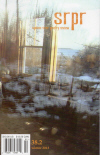Spoon River Poetry Review – Winter 2013
Readers looking for poetic range in vast quantities, this is the issue for you! Over 100 pages of work that I would bet contains at least three things even the pickiest of perusers will enjoy. I found that I had to keep myself very present while reading through the issue because I would have gotten lost in the variety of words presented.
Readers looking for poetic range in vast quantities, this is the issue for you! Over 100 pages of work that I would bet contains at least three things even the pickiest of perusers will enjoy. I found that I had to keep myself very present while reading through the issue because I would have gotten lost in the variety of words presented.
A primary example of content range is available very early in the issue. Editor Prize winning poems are presented toward the beginning of the issue. Jesse Nissim was awarded first place for a piece titled “Fire” in which the subject of poetry itself is analyzed. I understand that some people harbor negative feelings toward poetry about poetry, but lines like, “The poem had numbness at its center and tingling into its extremities,” and “someone . . . threw a hard object at the overhead light, breaking the bulb casing and sending a spark across the ceiling” prove worthy enough to me, and more importantly judge Juliana Spahr, as prize-worthy.
Getting back to the idea of range contained in this issue, one of the other poems selected for print from the Editor Prize contest was written by Leland James. “A Brief History of the Electric Chair” was a very haunting piece that tackled specific death row cases in lines like, “People say odd things, one very different / from another, when they are about to be / executed: ‘Good people are always so sure / they’re right,’ said Barbara Graham,” but also cast a wider net with lines like “No more jeering crowds with picnic lunches / on Sunday afternoons. No more last public jaunts / in oxcarts to the gallows. No more twisting.”
One major highlight after reading a varied spread of work is the featured set by Illinois poet Jason Bredle. Every issue highlights a poet with a deep connection to Illinois, and since I live in Washington state, I really appreciate the opportunity to be shown hand selected work from outside of my region. Thirteen poems by Bredle are included, with my personal favorites being “Pinball City,” “Army of Dolphins,” and “Gore Monster.” Bits of surrealism and humor are laced throughout each work, highlighting a creativity that is sometimes lost in what can be such serious business. “Army of Dolphins” is a full-page poem that exemplifies this, with lines like: “we’d prefer to fight / an army of dolphins / and not a dolphin army.” After reading these poems, I was glad to get a chance to read the included interview, by Joanne Diaz, which dove a little further into Bredle’s writing style and inspirations.
Visual art also gets a shout out in this journal, but from a writing perspective. Katy Didden’s essay, “Portals, Placentas, and the Corpus Entire: Three Takes on Ekphrasis,” takes a look at three poets and how their differing styles were all able to use visual representations to guide their words. This is nineteen-page article dives into some intricate detail, but the following paragraph quotation hits the nail on the head as to why pictures and poetics work so well together:
While skillful observation might be a prerequisite for poetry, these particular poets have a panoramic scope. Each uses reading and research—in the form of epigrams, quotations, and anecdotes—not just as background for poems, but often as a subject, or at least a feature, of poems. In many ways, then, their use of visual material is an extension of the kind of information gathering that they already practice in their work.
Contributors in this issue of SRPR hail from Spain to New York, Israel to California. Kudos to the editors for their bravery in putting together a magazine that seemingly represents the vastness of submissions received, in content and geographically.
[www.srpr.org]





